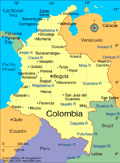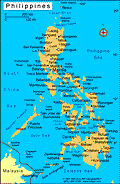Terrorist Trouble Spots Around the World
Updated February 21, 2017 | Factmonster Staff 

Terrorist Trouble Spots Around the World
The U.S. State Department cites seven nations—Cuba, Iran, Iraq, Libya, North Korea, Sudan, and Syria—as state sponsors of terrorism. The nations have long been accused of helping various violent groups.
A nation could help terrorists in varying degrees: by providing sanctuary for suspects wanted elsewhere, supplying weapons, money, and intelligence, or in actually planning attacks, in effect using these organizations as "sub-contractors."
In the wake of the September 11, 2001, attacks, the State Department issued a worldwide travel caution, urging Americans traveling outside the U.S. "to maintain a high level of vigilance and to increase their security awareness." Specific warnings were issued for Turkmenistan, Pakistan, and Yemen.
Here are some other nations troubled by terrorism.
A nation could help terrorists in varying degrees: by providing sanctuary for suspects wanted elsewhere, supplying weapons, money, and intelligence, or in actually planning attacks, in effect using these organizations as "sub-contractors."
In the wake of the September 11, 2001, attacks, the State Department issued a worldwide travel caution, urging Americans traveling outside the U.S. "to maintain a high level of vigilance and to increase their security awareness." Specific warnings were issued for Turkmenistan, Pakistan, and Yemen.
Here are some other nations troubled by terrorism.
Colombia | East Africa | Greece | Nigeria | Philippines | Yemen
Colombia
In August 2001, Colombian police arrested four members of the Irish Republican Army (IRA) who were visiting facilities operated by the Revolutionary Armed Forces of Colombia (FARC). One of the IRA members was reportedly teaching English to terrorists at a FARC camp, while the others had apparently been showing the Colombians how to manufacture gasoline bombs. One of those arrested, Niall Connally, is said to be the IRA's chief operative in Latin America, coordinating terrorist operations from Cuba. In 1999 the State Department said Colombia was one of four nations (along with Greece, Nigeria, and Yemen) seeing a sizable increase in terrorist attacks against Americans. In 1999 there were 91 attacks on U.S. targets, including bombings of an oil pipeline. That year, three Americans working with U'Wa Indians in northeast Colombia were abducted and killed. FARC finances its operations partly through ransoms paid to kidnappers. There were 3,000 kidnappings reported in Colombia in 2000. Since 1990, 35,000 people have died in Colombia's civil war. |
| East Africa Two Americans visiting the Bwindi Impenetrable National Park in Uganda were killed in 1999. They were part of a tour group captured by members of the Interahamwe, the Hutu force battling the Tutsi-led government in Rwanda. Americans were killed because the U.S. is perceived to be friendly to the present Tutsi regime. In 1994, the then Hutu-led government of Rwanda launched a genocide that killed some 800,000 Tutsis and moderate Hutus. In response, a Tutsi army toppled that government, prompting some two million Hutus, including the Interahamwe, to flee to neighboring countries. Sporadic fighting has continued ever since. |
Greece
In a 1999 report, the U.S. State Department criticized Greece for failing to do enough to fight terrorism, which is periodic in that country. The marxist November 17 terrorist organization has been blamed for sporadic attacks on American interests since the 1975 murder of the CIA station chief. November 17 arose from the resistance to the military junta that ruled Greece from 1967 to 1975. It is named for the date of a 1973 student uprising crushed by the military. Because the group is believed to be very small, perhaps no more than 25 members, police have never been able to penetrate it. However, some observers have suggested that since many Greek political leaders were also involved in the resistance, there may be reluctance to bring November 17 to justice. |
Nigeria
A mix of as many as 400 ethnic and linguistic groups, this vast African nation has been troubled by ethnic violence and sporadic terrorist attacks against U.S. interests. Much of the anti-Western violence has occurred in the southeast, where various ethnic groups have been fighting over their share of the oil wealth now being developed in the region. In 1999, foreign oil workers have been kidnapped and oil pipelines attacked. |
Philippines
Several groups, some believed to have connections to Osama bin Laden, have been fighting for a Muslim homeland in the south of the Philippines since the 1970s. Thousands of people have died in the conflict. Rebels occasionally take foreign tourists and Filipinos hostage. In 2000 Libya arranged for the release of tourists kidnapped from a nearby Malaysian resort island. |
Yemen
Its tribal tradition of kidnapping foreigners for ransom and its government's inability to control remote areas, have made Yemen a haven for Middle Eastern terrorists. Foreign tourists have been kidnapped in recent years and two U.S. embassy employees managed to avoid being captured in 1999. Osama bin Laden is widely suspected of involvement in the 2000 bombing of the USS Cole when it was docked in Aden, Yemen. The blast killed 17 US service personnel. The investigation into the bombing was hampered by a lack of cooperation from Yemeni officials. The use of plastics explosives indicated the attackers possibly received help from a foreign government, such as Iraq or Iran. |
| Related Links | |
| Osama bin Laden Remembering September 11 Map of Sept. 11, 2001 Attacks Terrorism Around the World | State-Sponsored Terrorism International Terrorist Organizations |
See also:





